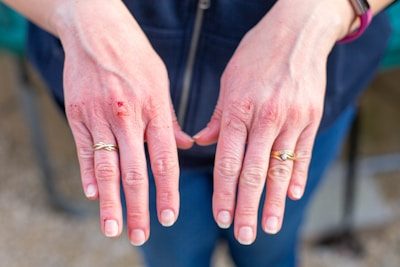Eczema (Atopic Dermatitis)

Atopic Dermatitis (Eczema) Atopic dermatitis, commonly called eczema, is a chronic skin condition that affects approximately 200 million people worldwide. It is characterized by itchy, inflamed skin and often begins in childhood, although it can occur at any age. Atopic dermatitis is part of a group of diseases known as atopic diseases, which also includes asthma and hay fever. This is a chronic disease, meaning it persists for a long time and usually lasts a lifetime. Individuals with atopic dermatitis have sensitive skin that reacts strongly to certain triggers, exacerbating the condition.
Eczema Symptoms The symptoms of eczema can vary from person to person, but the most common include:
- Dry, itchy skin: This is a hallmark symptom of eczema.
- Red to brownish-gray patches: These often appear on the hands, feet, ankles, wrists, neck, upper chest, eyelids, inside the elbows, and behind the knees, which are areas particularly prone to these symptoms.
- Small, raised bumps: These may leak fluid and crust over when scratched.
- Thickened, cracked, scaly skin: As the condition progresses, the skin may become thicker and develop cracks.
- Sensitive, swollen, and sore from scratching: Continuous scratching can make the skin more sensitive and swollen, further exacerbating discomfort.
Causes and Risk Factors: The exact cause of atopic dermatitis is not yet clear, but it is thought to be caused by a combination of genetic, environmental, and immune factors. People with a family history of eczema, asthma, or hay fever are more likely to develop atopic dermatitis.
Risk factors include: Family history of atopic diseases:
Having a family history increases the likelihood of developing the condition.
Location where you live: Atopic dermatitis is more common in urban areas and in climates with low humidity.
Gender: Females are slightly more likely to develop this condition.
The Importance of Diagnosis and Treatment
Atopic dermatitis can significantly impact a person's quality of life. It may cause sleep problems, self-consciousness about appearance, and complications such as skin infections; therefore, obtaining a timely and accurate diagnosis and starting treatment is crucial. Treatment for atopic dermatitis aims to heal the affected skin, relieve symptoms, and prevent the condition from worsening. Having a comprehensive treatment plan and following it can significantly reduce symptoms and improve quality of life. If you think you or your child may have atopic dermatitis, it is important to schedule a consultation. Our clinic treats atopic dermatitis, including offering specific narrowband UVB phototherapy (NB-UVB), a treatment option available only in a few clinics in Hong Kong.
Reference:
American Academy of Dermatology Association https://www.aad.org/public/diseases/eczema/types/atopic-dermatitis
Guidelines for the diagnosis and assessment of eczema https://dermnetnz.org/topics/guidelines-for-the-diagnosis-and-assessment-of-eczema
National Eczema Association https://nationaleczema.org/eczema/
British Association of Dermatologists https://www.bad.org.uk/pils/atopic-eczema/
